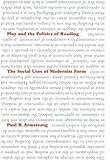Play and the Politics of Reading : The Social Uses of Modernist Form / Paul B. Armstrong.
Material type: TextPublisher: Ithaca, NY : Cornell University Press, [2018]Copyright date: 2005Description: 1 online resource (224 p.)Content type:
TextPublisher: Ithaca, NY : Cornell University Press, [2018]Copyright date: 2005Description: 1 online resource (224 p.)Content type: - 9781501720659
- Books and reading -- Great Britain -- History -- 20th century
- English fiction -- 20th century -- History and criticism
- Literary form -- History -- 20th century
- Literature and society -- Great Britain -- History -- 20th century
- Modernism (Literature) -- Great Britain
- Literary Studies
- LITERARY CRITICISM / Semiotics & Theory
- 820.9/355 23
- PR888.M63A89 2005
- online - DeGruyter
| Item type | Current library | Call number | URL | Status | Notes | Barcode | |
|---|---|---|---|---|---|---|---|
 eBook
eBook
|
Biblioteca "Angelicum" Pont. Univ. S.Tommaso d'Aquino Nuvola online | online - DeGruyter (Browse shelf(Opens below)) | Online access | Not for loan (Accesso limitato) | Accesso per gli utenti autorizzati / Access for authorized users | (dgr)9781501720659 |
Browsing Biblioteca "Angelicum" Pont. Univ. S.Tommaso d'Aquino shelves, Shelving location: Nuvola online Close shelf browser (Hides shelf browser)

|

|

|

|

|

|

|
||
| online - DeGruyter Governing the World's Money / | online - DeGruyter Knowing the Past : Victorian Literature and Culture / | online - DeGruyter The New American Workplace : Transforming Work Systems in the United States / | online - DeGruyter Play and the Politics of Reading : The Social Uses of Modernist Form / | online - DeGruyter Realms of Ritual : Burgundian Ceremony and Civic Life in Late Medieval Ghent / | online - DeGruyter Sanin : A Novel / | online - DeGruyter The Song of Songs in the Middle Ages / |
Frontmatter -- CONTENTS -- PREFACE -- Part One: Theory -- 1. The Politics of Reading: Nonconsensual Reciprocity and the Negotiation of Differences -- 2. Play, Power, and Difference: The Social Implications of Iscr's Aesthetic Theory -- 3. Being "Out of Place": Edward Said and the Contradictions of Cultural Differences -- Part Two: Criticism -- 4. ART AND THE CONSTRUCTION OF COMMUNITY IN "THE DEATH OF THE LION" -- 5. Historicizing Conrad: Temporal Form and the Politics of Reading -- 6. Misogyny and the Ethics of Reading: The Problem of Conrad's Chance -- 7. Liberalism and the Politics of Form: The Ambiguous Narrative Voice in Howards End -- 8. Reading India: The Double Turns of Forster's Pragmatism -- 9. JAMES JOYCE AND THE POLITICS OF READING -- Pedagogical Postscript: Liberal Education, the English Major, and Pluralistic Literacy -- WORKS CITED -- INDEX
restricted access online access with authorization star
http://purl.org/coar/access_right/c_16ec
"Classrooms and curricula should be structured to foster the playful interaction that can teach students how to negotiate social and political differences in an emancipatory, noncoercive manner. Teaching reading as a playful exercise of reciprocity with otherness can help prepare students for a democracy understood as a community of communities."—from the "Pedagogical Postscript"Reading is socially useful, in Paul B. Armstrong's view, and can model democratic interaction by a community unconstrained by the need to build consensus but aware of the dangers of violence, irrationality, and anarchy. Reading requires mutual recognition but need not culminate in agreement, Armstrong says; instead, the social potential of reading arises from the active exchange of attitudes, ideas, and values between author and reader and among readers. Play and the Politics of Reading, which has important implications for education, draws on Wolfgang Iser's notion of free play to offer a valuable response to social problems.Armstrong finds that Joseph Conrad, E. M. Forster, Henry James, and James Joyce provide apt examples of the politics of reading, for reasons both literary and political. In making the transition from realism to modernism, these authors experimented with narrative strategies that seek simultaneously to represent the world and to question the means of representation itself. The formal ambiguities and complexities of such texts as Howards End and Ulysses are ways of staging for the reader the difficulties and opportunities of a world of differences. Innovative formal structures challenge readers to reconsider their assumptions and beliefs about social issues.
Mode of access: Internet via World Wide Web.
In English.
Description based on online resource; title from PDF title page (publisher's Web site, viewed 26. Aug 2024)


